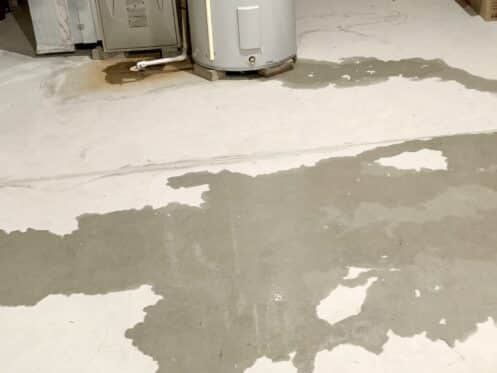The water heater is one of the most important appliances in a home, but it’s also often the one that gets neglected the most. One thing you don’t want to do when it comes to your water heater is wait too long before you hire a plumber to replace it. The longer you wait, the greater the risk is of your system failing and leaving you without hot water until you can get a replacement water heater.
In this article, we’ll look at the signs you should watch for so that you know when you should schedule a water heater replacement.
1. Water Is Leaking Out of the Tank
One sign that you need to replace a traditional water heater immediately is if the tank has started leaking. Although the inside of the steel tank has a glass or ceramic coating intended to prevent rust, this coating deteriorates over time and eventually leads to the tank rusting. At some point, the tank can start to rust through, developing a small leak.
The concern once the steel has started to rust through is that the rust can weaken the tank to the point where the pressure of the hot water causes it to suddenly burst and create a major flood. If this happens and you’re not there to immediately shut the water off, it can result in thousands of gallons of water flooding the entire area and causing extensive water damage.
Once a water heater is about eight years old, the chances of it beginning to leak are much higher. As such, it’s important that you regularly check your water heater for any leaks and immediately close the shut-off valve on top of the unit if it’s leaking. You should also make sure to shut off the gas or electricity. That way, the water will start to cool so that you can then safely drain the tank. The pressure inside the tank decreases when the water starts to cool, which helps to lessen the chances of the tank bursting before you can drain it.
2. Hot Water Is Brown or Rusty
Brown or rusty colored hot water can be another sign that your water heater tank is seriously rusted and at risk of leaking. However, it can also be a sign that the anode rod is worn out, and you need to have it replaced. The metal coating on the anode rod gets sacrificed to prevent minerals from interacting with the tank and causing it to rust and corrode.
In most cases, it only takes about five years for the coating to be almost entirely gone, resulting in the anode rod no longer attracting corrosive minerals, and the steel starts to rust.
If your hot water is rusty because of a worn-out anode rod, a plumbing service can often fix the problem by replacing the rod and then draining and refilling the tank. Before doing so, they’ll first inspect the exterior of the tank for any signs of rust or leaks, just to make sure that the water heater doesn’t need to be replaced.
3. Water Heater Is 10-12 Years Old
Even if your water heater isn’t leaking and appears to be working properly, we still recommend replacing it as soon as possible if it’s 10 years old or older. Traditional gas water heaters can last for 12 years or more, while electric units may last for 15 years or longer.
Nonetheless, the older the unit is, the greater the chance it has of starting to leak or suddenly failing. Replacing an old water heater is also a simple way to lower your energy bills. That’s partly because new water heaters tend to be more energy-efficient, and also because most older water heaters have issues that cause them to heat more slowly and use more energy.
4. Water Heater Takes Much Longer to Reheat
Another sign that your water heater is on its last legs and may soon fail is if it takes significantly longer to reheat whenever you run out of hot water. Electric water heaters have an average recovery rate of around 20-25 gallons per hour, which means you’ll typically need to wait about two hours before the water in a 50-gallon unit is fully hot again. Gas water heaters heat much faster and usually have a recovery rate of 30-40 gallons per hour or sometimes even 50-60 gallons per hour for high-efficiency units.
If your unit’s recovery rate is much longer than it used to be, it means it isn’t heating effectively. This can occur as a result of sediment buildup from not flushing the tank frequently enough. In this case, you can resolve the problem by shutting the unit off, then draining and flushing the tank once the water has cooled down.
Ineffective heating can also indicate that there’s a problem with the gas burner or electric heating elements. A plumber can replace a failed electric heating element fairly quickly and easily, but it’s typically only worth it if you can expect to get a few more years of life out of the unit.
Replacing the gas burner is more difficult and usually not worth the cost. In most cases, you’ll have to pay a plumber about the same amount to replace the burner as you would to have them install a new water heater.
5. Temperature Fluctuations and Inconsistent Heating
Fluctuations in the temperature of your hot water can be a sign that the water heater’s temperature control is malfunctioning and needs to be replaced. What can happen in this case is that the thermostat doesn’t always register the correct temperature, resulting in the water heater sometimes shutting off too soon or continuing to heat once the water reaches the right temperature.
Fluctuations in temperature can also be a sign that the unit isn’t providing consistent heat. This can happen because there’s a large amount of sediment buildup in the tank or because of an issue with the burner or electric heating element.
6. Hot Water Runs Out Quickly
There are generally only two reasons why your hot water will start running out faster than it used to: a broken dip tube or an excessive amount of sediment buildup. The dip tube connects to the cold water inlet pipe and extends down to the bottom of the tank.
That means the incoming cold water flows out at the bottom of the tank and doesn’t mix with the hot water toward the top of the tank. If the dip tube is broken, the cold and hot water will mix and cause the temperature to quickly decrease. That means the water can start running fairly cold not long after you start showering.
The reason that excessive sediment buildup can cause you to run out of hot water faster is simply that the layer of sediment decreases the amount of hot water the tank can hold. You can sometimes fix this problem by flushing the tank. However, if the tank hasn’t been flushed for years, it often won’t be possible to flush out the sediment. In this case, your options are to live with having less available hot water or to replace your water heater.
For the most reliable water heater services in Chatham and Northern New Jersey, look to Pipe Works Services. We’ve been serving homeowners for the past 25 years and carry a range of top-quality tank and tankless water heaters.
If you need to get your water heater inspected or install a replacement, contact us to set up an appointment.





